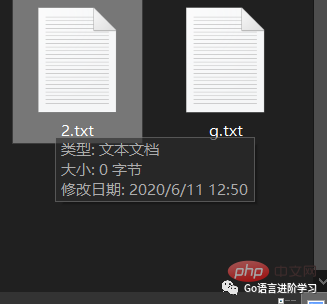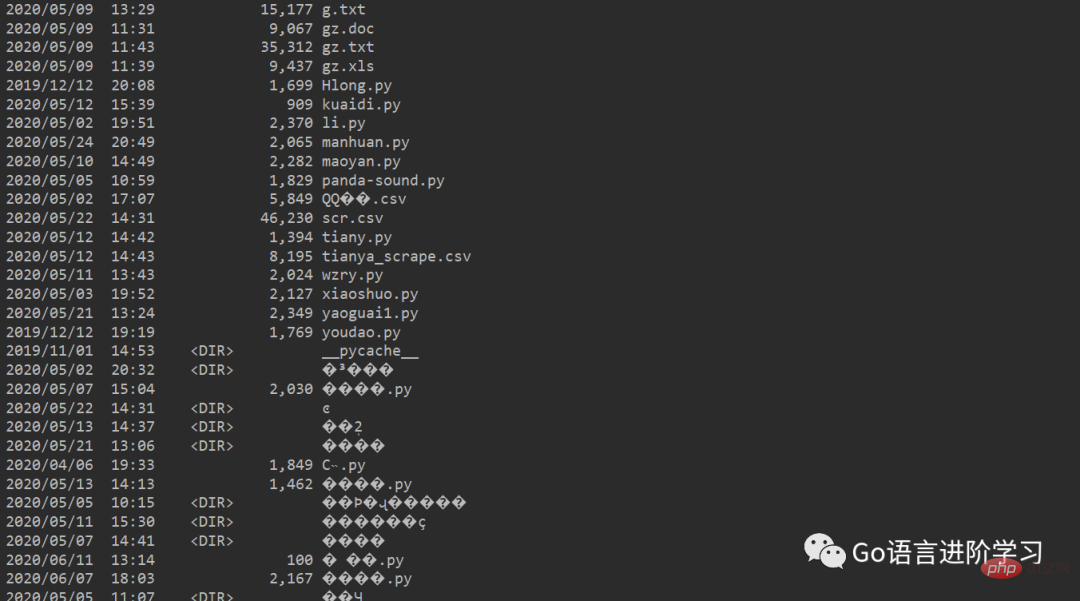Take stock of the uses of the os module in Python
1. Overview of the os module
The Python os module contains common operating system functions.
##2. The role of the os module
can handle files and directories These are the operations we need to do manually every day. This module is especially important if you want your program to be platform-independent.
3. Commonly used methods
1. os.name
The output string indicates the platform being used. If it is window, it is represented by 'nt', for Linux/Unix users, it is 'posix'. import os
print(os.name)
The running system is win, so 'nt' is returned. <br/>

<br/>
#2. os.getcwd()
The function gets the current working directory, which is the directory path where the current Python script works.
import os print(os.getcwd())
Run result: <br/>

Returns all file and directory names in the specified directory.
运行结果:<br/> <br/> 例:删除一个文件。 在当前目录创建一个2.txt文件,等下通过代码删除文件。 删除2.txt文件。<br/> 运行shell命令。 运行结果<br/> 函数返回一个路径的目录名和文件名。 在当前目录下,随便打开一个文件,可以收看文件地点大小。 运行结果: 14. os.path.splitext():分离文件名与扩展名。import os
name=os.listdir(os.getcwd())
print(name)

4. os.remove()

import os
name=os.listdir(os.getcwd())
os.remove("2.txt")5. os.system()<br/>
import os
name=os.system('dir')
print(name)

6. os.sep 可以取代操作系统特定的路径分割符。
import os
print(os.sep)
#Windows 运行结果
'\\'
<br/>
7. os.linesep字符串给出当前平台使用的行终止符
print(os.linesep)'\r\n' #Windows使用'\r\n',Linux使用'\n'而Mac使用'\r'。 print(os.sep)'\\' #Windows
8. os.path.split()<br/>
os.path.split('C:\\Python25\\abc.txt')#运行结果('C:\\Python25', 'abc.txt') #返回路径
9. os.path.isfile()和os.path.isdir()函数分别检验给出的路径是一个文件还是目录。<br/>
os.path.isdir(os.getcwd())#运行结果True #如果路径相同返回trueos.path.isfile('a.txt')#运行结果False #如果路径不同返回false
10. os.path.exists()函数用来检验给出的路径是否真地存在
os.path.exists('C:\\Python25\\abc.txt')#运行结果False #如果路径不存在返回falseos.path.exists('C:\\Python25')#运行结果True #如果路径存在返回true
11. os.path.abspath(name):获得绝对路径。
import os
name=os.path.abspath("1.doc")
print(name)12. os.path.normpath(path):规范path字符串形式。
import os
name=os.path.normpath("1.doc")print(name)13. os.path.getsize(name):获得文件大小,如果name是目录返回0L。
import osname1=os.path.getsize("1.doc")print(name1)
>>> os.path.splitext('a.txt')#运行结果('a', '.txt')
15. os.path.join(path,name):连接目录与文件名或目录。
>>> os.path.join('c:\\Python','a.txt')#运行结果'c:\\Python\\a.txt' >>> os.path.join('c:\\Python','f1') #运行结果'c:\\Python\\f1'
16. os.path.basename(path):返回文件名。
>>> os.path.basename('a.txt')#运行结果'a.txt'>>> os.path.basename('c:\\Python\\a.txt')#运行结果'a.txt'
17. os.path.dirname(path):返回文件路径。
>>> os.path.dirname('c:\\Python\\a.txt')#运行结果'c:\\Python
四、总结
本文主要介绍了Python基础中os模块的使用,介绍了主要的操作文件的方法,以及os模块在实际应用需要注意的问题,做了详细地点讲解。
The above is the detailed content of Take stock of the uses of the os module in Python. For more information, please follow other related articles on the PHP Chinese website!

Hot AI Tools

Undresser.AI Undress
AI-powered app for creating realistic nude photos

AI Clothes Remover
Online AI tool for removing clothes from photos.

Undress AI Tool
Undress images for free

Clothoff.io
AI clothes remover

Video Face Swap
Swap faces in any video effortlessly with our completely free AI face swap tool!

Hot Article

Hot Tools

Notepad++7.3.1
Easy-to-use and free code editor

SublimeText3 Chinese version
Chinese version, very easy to use

Zend Studio 13.0.1
Powerful PHP integrated development environment

Dreamweaver CS6
Visual web development tools

SublimeText3 Mac version
God-level code editing software (SublimeText3)

Hot Topics
 1392
1392
 52
52
 36
36
 110
110
 PHP and Python: Different Paradigms Explained
Apr 18, 2025 am 12:26 AM
PHP and Python: Different Paradigms Explained
Apr 18, 2025 am 12:26 AM
PHP is mainly procedural programming, but also supports object-oriented programming (OOP); Python supports a variety of paradigms, including OOP, functional and procedural programming. PHP is suitable for web development, and Python is suitable for a variety of applications such as data analysis and machine learning.
 Choosing Between PHP and Python: A Guide
Apr 18, 2025 am 12:24 AM
Choosing Between PHP and Python: A Guide
Apr 18, 2025 am 12:24 AM
PHP is suitable for web development and rapid prototyping, and Python is suitable for data science and machine learning. 1.PHP is used for dynamic web development, with simple syntax and suitable for rapid development. 2. Python has concise syntax, is suitable for multiple fields, and has a strong library ecosystem.
 Can visual studio code be used in python
Apr 15, 2025 pm 08:18 PM
Can visual studio code be used in python
Apr 15, 2025 pm 08:18 PM
VS Code can be used to write Python and provides many features that make it an ideal tool for developing Python applications. It allows users to: install Python extensions to get functions such as code completion, syntax highlighting, and debugging. Use the debugger to track code step by step, find and fix errors. Integrate Git for version control. Use code formatting tools to maintain code consistency. Use the Linting tool to spot potential problems ahead of time.
 Can vs code run in Windows 8
Apr 15, 2025 pm 07:24 PM
Can vs code run in Windows 8
Apr 15, 2025 pm 07:24 PM
VS Code can run on Windows 8, but the experience may not be great. First make sure the system has been updated to the latest patch, then download the VS Code installation package that matches the system architecture and install it as prompted. After installation, be aware that some extensions may be incompatible with Windows 8 and need to look for alternative extensions or use newer Windows systems in a virtual machine. Install the necessary extensions to check whether they work properly. Although VS Code is feasible on Windows 8, it is recommended to upgrade to a newer Windows system for a better development experience and security.
 Is the vscode extension malicious?
Apr 15, 2025 pm 07:57 PM
Is the vscode extension malicious?
Apr 15, 2025 pm 07:57 PM
VS Code extensions pose malicious risks, such as hiding malicious code, exploiting vulnerabilities, and masturbating as legitimate extensions. Methods to identify malicious extensions include: checking publishers, reading comments, checking code, and installing with caution. Security measures also include: security awareness, good habits, regular updates and antivirus software.
 Python vs. JavaScript: The Learning Curve and Ease of Use
Apr 16, 2025 am 12:12 AM
Python vs. JavaScript: The Learning Curve and Ease of Use
Apr 16, 2025 am 12:12 AM
Python is more suitable for beginners, with a smooth learning curve and concise syntax; JavaScript is suitable for front-end development, with a steep learning curve and flexible syntax. 1. Python syntax is intuitive and suitable for data science and back-end development. 2. JavaScript is flexible and widely used in front-end and server-side programming.
 PHP and Python: A Deep Dive into Their History
Apr 18, 2025 am 12:25 AM
PHP and Python: A Deep Dive into Their History
Apr 18, 2025 am 12:25 AM
PHP originated in 1994 and was developed by RasmusLerdorf. It was originally used to track website visitors and gradually evolved into a server-side scripting language and was widely used in web development. Python was developed by Guidovan Rossum in the late 1980s and was first released in 1991. It emphasizes code readability and simplicity, and is suitable for scientific computing, data analysis and other fields.
 How to run programs in terminal vscode
Apr 15, 2025 pm 06:42 PM
How to run programs in terminal vscode
Apr 15, 2025 pm 06:42 PM
In VS Code, you can run the program in the terminal through the following steps: Prepare the code and open the integrated terminal to ensure that the code directory is consistent with the terminal working directory. Select the run command according to the programming language (such as Python's python your_file_name.py) to check whether it runs successfully and resolve errors. Use the debugger to improve debugging efficiency.




